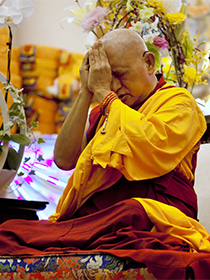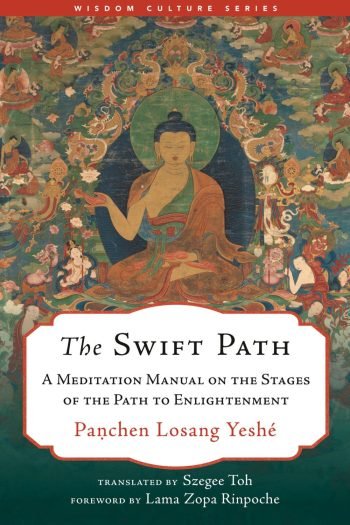- Home
- FPMT Homepage
Foundation for the Preservation of the Mahayana Tradition
The FPMT is an organization devoted to preserving and spreading Mahayana Buddhism worldwide by creating opportunities to listen, reflect, meditate, practice and actualize the unmistaken teachings of the Buddha and based on that experience spreading the Dharma to sentient beings. We provide integrated education through which people’s minds and hearts can be transformed into their highest potential for the benefit of others, inspired by an attitude of universal responsibility and service. We are committed to creating harmonious environments and helping all beings develop their full potential of infinite wisdom and compassion. Our organization is based on the Buddhist tradition of Lama Tsongkhapa of Tibet as taught to us by our founders Lama Thubten Yeshe and Lama Thubten Zopa Rinpoche.
- Willkommen
Die Stiftung zur Erhaltung der Mahayana Tradition (FPMT) ist eine Organisation, die sich weltweit für die Erhaltung und Verbreitung des Mahayana-Buddhismus einsetzt, indem sie Möglichkeiten schafft, den makellosen Lehren des Buddha zuzuhören, über sie zur reflektieren und zu meditieren und auf der Grundlage dieser Erfahrung das Dharma unter den Lebewesen zu verbreiten.
Wir bieten integrierte Schulungswege an, durch denen der Geist und das Herz der Menschen in ihr höchstes Potential verwandelt werden zum Wohl der anderen – inspiriert durch eine Haltung der universellen Verantwortung und dem Wunsch zu dienen. Wir haben uns verpflichtet, harmonische Umgebungen zu schaffen und allen Wesen zu helfen, ihr volles Potenzial unendlicher Weisheit und grenzenlosen Mitgefühls zu verwirklichen.
Unsere Organisation basiert auf der buddhistischen Tradition von Lama Tsongkhapa von Tibet, so wie sie uns von unseren Gründern Lama Thubten Yeshe und Lama Thubten Zopa Rinpoche gelehrt wird.
- Bienvenidos
La Fundación para la preservación de la tradición Mahayana (FPMT) es una organización que se dedica a preservar y difundir el budismo Mahayana en todo el mundo, creando oportunidades para escuchar, reflexionar, meditar, practicar y actualizar las enseñanzas inconfundibles de Buda y en base a esa experiencia difundir el Dharma a los seres.
Proporcionamos una educación integrada a través de la cual las mentes y los corazones de las personas se pueden transformar en su mayor potencial para el beneficio de los demás, inspirados por una actitud de responsabilidad y servicio universales. Estamos comprometidos a crear ambientes armoniosos y ayudar a todos los seres a desarrollar todo su potencial de infinita sabiduría y compasión.
Nuestra organización se basa en la tradición budista de Lama Tsongkhapa del Tíbet como nos lo enseñaron nuestros fundadores Lama Thubten Yeshe y Lama Zopa Rinpoche.
A continuación puede ver una lista de los centros y sus páginas web en su lengua preferida.
- Bienvenue
L’organisation de la FPMT a pour vocation la préservation et la diffusion du bouddhisme du mahayana dans le monde entier. Elle offre l’opportunité d’écouter, de réfléchir, de méditer, de pratiquer et de réaliser les enseignements excellents du Bouddha, pour ensuite transmettre le Dharma à tous les êtres. Nous proposons une formation intégrée grâce à laquelle le cœur et l’esprit de chacun peuvent accomplir leur potentiel le plus élevé pour le bien d’autrui, inspirés par le sens du service et une responsabilité universelle. Nous nous engageons à créer un environnement harmonieux et à aider tous les êtres à épanouir leur potentiel illimité de compassion et de sagesse. Notre organisation s’appuie sur la tradition guéloukpa de Lama Tsongkhapa du Tibet, telle qu’elle a été enseignée par nos fondateurs Lama Thoubtèn Yéshé et Lama Zopa Rinpoché.
Visitez le site de notre Editions Mahayana pour les traductions, conseils et nouvelles du Bureau international en français.
Voici une liste de centres et de leurs sites dans votre langue préférée
- Benvenuto
L’FPMT è un organizzazione il cui scopo è preservare e diffondere il Buddhismo Mahayana nel mondo, creando occasioni di ascolto, riflessione, meditazione e pratica dei perfetti insegnamenti del Buddha, al fine di attualizzare e diffondere il Dharma fra tutti gli esseri senzienti.
Offriamo un’educazione integrata, che può trasformare la mente e i cuori delle persone nel loro massimo potenziale, per il beneficio di tutti gli esseri, ispirati da un’attitudine di responsabilità universale e di servizio.
Il nostro obiettivo è quello di creare contesti armoniosi e aiutare tutti gli esseri a sviluppare in modo completo le proprie potenzialità di infinita saggezza e compassione.
La nostra organizzazione si basa sulla tradizione buddhista di Lama Tsongkhapa del Tibet, così come ci è stata insegnata dai nostri fondatori Lama Thubten Yeshe e Lama Zopa Rinpoche.
Di seguito potete trovare un elenco dei centri e dei loro siti nella lingua da voi prescelta.
- 欢迎 / 歡迎
简体中文
“护持大乘法脉基金会”( 英文简称:FPMT。全名:Foundation for the Preservation of the Mahayana Tradition) 是一个致力于护持和弘扬大乘佛法的国际佛教组织。我们提供听闻,思维,禅修,修行和实证佛陀无误教法的机会,以便让一切众生都能够享受佛法的指引和滋润。
我们全力创造和谐融洽的环境, 为人们提供解行并重的完整佛法教育,以便启发内在的环宇悲心及责任心,并开发内心所蕴藏的巨大潜能 — 无限的智慧与悲心 — 以便利益和服务一切有情。
FPMT的创办人是图腾耶喜喇嘛和喇嘛梭巴仁波切。我们所修习的是由两位上师所教导的,西藏喀巴大师的佛法传承。
繁體中文
護持大乘法脈基金會”( 英文簡稱:FPMT。全名:Found
ation for the Preservation of the Mahayana Tradition ) 是一個致力於護持和弘揚大乘佛法的國際佛教組織。我們提供聽聞, 思維,禪修,修行和實證佛陀無誤教法的機會,以便讓一切眾生都能 夠享受佛法的指引和滋潤。 我們全力創造和諧融洽的環境,
為人們提供解行並重的完整佛法教育,以便啟發內在的環宇悲心及責 任心,並開發內心所蘊藏的巨大潛能 — 無限的智慧與悲心 – – 以便利益和服務一切有情。 FPMT的創辦人是圖騰耶喜喇嘛和喇嘛梭巴仁波切。
我們所修習的是由兩位上師所教導的,西藏喀巴大師的佛法傳承。 察看道场信息:
- FPMT Homepage
- News/Media
-
- Study & Practice
-
-
- About FPMT Education Services
- Latest News
- Programs
- New to Buddhism?
- Buddhist Mind Science: Activating Your Potential
- Heart Advice for Death and Dying
- Discovering Buddhism
- Living in the Path
- Exploring Buddhism
- FPMT Basic Program
- FPMT Masters Program
- FPMT In-Depth Meditation Training
- Maitripa College
- Lotsawa Rinchen Zangpo Translator Program
- Universal Education for Compassion & Wisdom
- Online Learning Center
-
- Prayers & Practice Materials
- Overview of Prayers & Practices
- Full Catalogue of Prayers & Practice Materials
- Explore Popular Topics
- Benefiting Animals
- Chenrezig Resources
- Death & Dying Resources
- Lama Chopa (Guru Puja)
- Lama Zopa Rinpoche: Compendium of Precious Instructions
- Lama Zopa Rinpoche: Life Practice Advice
- Lama Zopa Rinpoche Practice Series
- Lamrim Resources
- Mantras
- Prayer Book Updates
- Purification Practices
- Sutras
- Thought Transformation (Lojong)
- Audio Materials
- Dharma Dates - Tibetan Calendar
- Translation Services
- Publishing Services
- Ways to Offer Support
- Prayers & Practice Materials
-
- Teachings and Advice
- Find Teachings and Advice
- Lama Zopa Rinpoche Advice Page
- Lama Zopa Rinpoche: Compendium of Precious Instructions
- Lama Zopa Rinpoche Video Teachings
- ༧སྐྱབས་རྗེ་བཟོད་པ་རིན་པོ་ཆེ་མཆོག་ནས་སྩལ་བའི་བཀའ་སློབ་བརྙན་འཕྲིན།
- Podcasts
- Lama Yeshe Wisdom Archive
- Buddhism FAQ
- Dharma for Young People
- Resources on Holy Objects
- Teachings and Advice
-
-
*If a menu item has a submenu clicking once will expand the menu clicking twice will open the page.
-
-
- Centers
-
- Teachers
-
- Projects
-
-
-
-
*If a menu item has a submenu clicking once will expand the menu clicking twice will open the page.
-
-
- FPMT
-
-
-
-
-
Our grabbing ego made this body manifest, come out. However, instead of looking at it negatively, we should regard it as precious. We know that our body is complicated, but from the Dharma point of view, instead of putting ourselves down with self-pity, we should appreciate and take advantage of it. We should use it in a good way.
Lama Thubten Yeshe
-
-
-
- Shop
-
-
-
The Foundation Store is FPMT’s online shop and features a vast selection of Buddhist study and practice materials written or recommended by our lineage gurus. These items include homestudy programs, prayers and practices in PDF or eBook format, materials for children, and other resources to support practitioners.
Items displayed in the shop are made available for Dharma practice and educational purposes, and never for the purpose of profiting from their sale. Please read FPMT Foundation Store Policy Regarding Dharma Items for more information.
-
-
Advice from Lama Zopa Rinpoche
31
We recently shared news about Wisdom Publications’ release of The Swift Path: A Meditation Manual on the Stages of the Path to Enlightenment by Panchen Losang Yeshe and translated by Szegee Toh into English. This book is the third title in the Wisdom Culture Series published by Wisdom Publications in association with FPMT.
This book contains a wonderful foreword by Lama Zopa Rinpoche, and we are sharing it here in its entirety. We hope this foreword will inspire you to read this extraordinary meditation manual in its entirety.
Foreword to The Swift Path: A Meditation Manual on the Stages of the Path to Enlightenment
By Lama Zopa Rinpoche
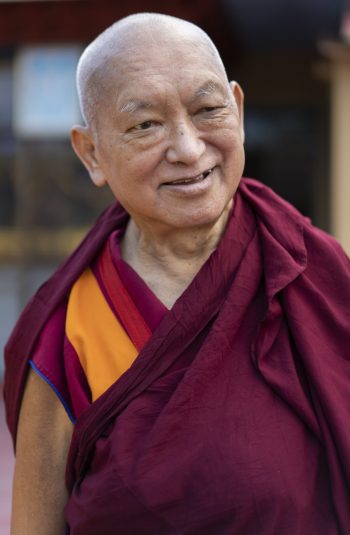
Lama Zopa Rinpoche at Kopan Monastery, Nepal, May 2022. Photo by Ven. Lobsang Sherab.
What is the importance of this text, the Swift Path by Paṇchen Losang Yeshe? To talk straight, millions and millions of people have depression. Why is that? I believe that the fundamental reason is because they lack an understanding of the meaning of life. In most cases, they haven’t met the Dharma, the path to enlightenment, so they don’t know the happiness that comes from practicing it. There are also people who have met the graduated path to enlightenment, the lamrim, but because they do not really practice it, the lamrim remains on paper; it does not go into their heart. And when, due to past karma, a problem involving an attachment to the happiness of this life arises, say their wife leaves them for someone else, they cannot bear it. They may even have an intellectual understanding of the lamrim, but without having really practiced it in their heart, they cannot renounce their attachment to their wife when she leaves them, or they become consumed by distress when someone important to them dies. It feels like they are the only person in the world experiencing that kind of suffering; with attachment, it can feel like that. In this state, they are vulnerable because of their past karma, their past harmful actions, and some people may even kill themselves in their extreme state.
Suicides even happened among the residents of the refugee camp in Buxa Duar, India, where, after escaping from Tibet, I lived for eight years and studied a little bit of philosophy. During that time, there was a monk who was a puja leader. After an influential person who had helped Tibet passed away, the Tibetans in general and the monks in particular were very upset. It was perhaps after that that he took his own life at a place on the way to Pasangkar, where I went many times along with some other monks to get injections for tuberculosis. On a mountain where there had been a landslide, the puja leader hanged himself. His body was found hanging from a high branch with a rope around his neck.
Likewise, when America was fighting in Iraq, every minute of the soldiers’ lives was uncertain. They saw many acts of violence. Because of this, when the soldiers who survived returned home to see their families, their minds were totally disturbed. They couldn’t see any meaning in life. I met one of these American soldiers at my retreat cave in Lawudo, Nepal. He was a very intelligent, highly trained soldier who found out about Lawudo on the internet, and he happened to be in Lawudo while I was there. I called him to come to my cave so that I could ask him some questions. He was someone who didn’t talk much, but he told me that the American government introduced the returned soldiers to mindfulness, which comes from Buddhism, because it makes the mind peaceful. I think the idea behind it was that by not thinking about the past and future, and by keeping the mind still, people feel a little bit better.
When people don’t know the meaning of life, and don’t know the happiness that comes from practicing the Dharma, they then experience unbelievable problems and unhappiness; they become chronically depressed, unable to recover. I heard once about a man in England who had been sick with depression for twenty-five years. He had been to see many doctors, but nothing helped. However, one day, when he was working in a vegetable garden, he tried to think that he was doing it for others. By this intention to use his life to benefit others, to work for others, to serve others, he was able to change his mind, and only then did his depression go away. Like “An apple a day keeps the doctor away,” “A thought to benefit others a day keeps depression away.”
What sort of Dharma should you practice? Phabongkha Dechen Nyingpo’s Liberation in the Palm of Your Hand says:
The Dharma you practice should be the sublime Mahayana, which leads fortunate capable beings to buddhahood. It should be the tradition of the two great charioteers, Nagarjuna and Asanga. It should be the profound instruction drawing out the essence of the thought of the glorious, unequaled Lama Atisha and the great Lama Tsongkhapa, the Dharma king of the three realms. It should set out all the vital points of the essence of the 84,000 teachings, without anything missing, as stages of practice for one person to achieve enlightenment.
Therefore, you should first make sure that the Dharma that you are going to study and practice is the main path traveled by all the buddhas of the three times—past, present, and future. The very heart of the 84,000 teachings taught by the Buddha, when condensed, is the holy Dharma that is the lamrim, the graduated path, which includes both the profound and vast stages. The five great treatises (on Prajnaparamita, Madhyamaka, Abhidharma, Pramaṇa, and Vinaya) that form the core curriculum of Gelug monasteries are elaborations of this holy Dharma. If you follow this path, like the buddhas of the three times, you will also be able to achieve buddhahood, the total cessation of obscurations and the completion of realizations.
If, instead, you follow a path that the holy beings of the past did not practice, you risk reaching a very strange place. You might experience the sufferings of the lower realms and the general sufferings of saṃsara for eons, with no chance for enlightenment. Therefore, before you rush to devour the Dharma that you intend to practice, like a dog rushes to food, you should thoroughly examine it. For, as Jamgon Sakya Paṇḍita said:
However much this life goes wrong,
there is neither harm nor benefit to your next life.
But if you meet a wrong Dharma,
all your future lives will go wrong.
If something else in your life goes wrong, even if you die and your consciousness is separated from your body, your consciousness will not necessarily go to the lower realms, where you would suffer for eons and eons; you might still go to a pure land or take a higher rebirth. But if you meet and practice a wrong Dharma and follow a wrong path, this could destroy your future lives for eons upon eons because of the negative imprints and habits it creates. You would not meet the Dharma and would not meet a virtuous friend for many lifetimes; you would instead experience great suffering. Do not be like many who, in my experience, practice whatever sounds good and makes them happy right now, never examining the nature of the teachings they are going to practice and where those teachings will lead them.
The instructions that you follow should be complete, with nothing missing, and unmistaken, and you should also be able to endure hardships to practice them. Otherwise, your effort will be mostly useless, in that you will not gain realizations, such as renunciation of the attachment to this life, and you will be unable to achieve enlightenment. As Milarepa said:
Without meditating on the meaning of the instructions of the oral lineage,
even if you cling to a retreat place, you will only torture yourself.
Milarepa was a lay person who achieved enlightenment in his lifetime during these degenerate times. After his father died, his aunt and uncle mistreated his family, causing his mother to advise Milarepa to learn black magic. He did so, and later, when the aunt and uncle were hosting a wedding at their house, Milarepa caused rocks from the mountain to crash down upon the house, utterly destroying it. The wedding guests upstairs and the animals downstairs were all killed.
Seeing what he had done, Milarepa felt great sadness and went to see his black magic teacher, who suggested that if he wanted to practice the Dharma, he should go to Lama Marpa. Upon finding him, Milarepa offered his body, speech, and mind. However, Marpa did not give him teachings for many years. Instead, he advised Milarepa to build a nine-story tower by himself (without any help from coolies!). After he built the tower, Marpa had him take it down and put all the stones back where he had found them, and this whole process was repeated two more times. After the third time, Marpa’s wife insisted that Marpa now give teachings to Milarepa. From Marpa’s side, he wanted Milarepa to bear hardships for even longer so that Milarepa would become enlightened much faster. But because his wife pushed him so much, Marpa, himself an enlightened being, manifested the maṇḍala of the deity and gave Milarepa initiation and teachings. Marpa then sent Milarepa to the mountains to do retreat. Bearing much hardship, Milarepa followed his guru’s instructions exactly, while subsisting on only nettles—without even any chili or salt! As a result, Milarepa became enlightened in that very life.
Just as the source of a river is traced back to a snow mountain, the source of the Dharma that you practice should trace back to Guru Shakyamuni Buddha, the founder of unmistaken teachings. Without an authentic source for the Dharma, even if you practice for a thousand years, you will not generate even one valid realization. It would be like wishing for butter by churning water. Thus the Dharma that you practice should have all three of these qualities: it should have been taught by the Buddha, the Omniscient One; it should have been examined well with quotations and logic and verified by the arya paṇḍitas of India; and it should have been actualized by yogis.
Many people in this world think that they are Buddhists when they don’t even have refuge in the Buddha, Dharma, and Sangha. The definition of a Buddhist is someone who has taken refuge from their heart by totally relying on the Buddha, Dharma, and Sangha, but these people don’t even recite a refuge prayer before they meditate. They don’t even have a statue of the Buddha in their house. When they meditate on emptiness, their meditation falls into either eternalism or nihilism, as it’s not the emptiness of the Middle Way. With nihilism, they think that nothing exists: there is no I, there is no action, there is no object, there is no saṃsara, there is no nirvaṇa.
One time when I was in Taiwan, I met a young man whose guru accepted only one disciple, who was him. He was trying hard to meditate, but his meditation on emptiness was contemplating that nothing exists. To tease him, I asked him, “Why do you go to the bathroom if nothing exists?” If nothing exists it means that there is no person who needs to urinate or defecate, no food or drink that was consumed, no urine or feces to expel, and no toilet in which to expel them. In the same way, there is no Buddha, Dharma, and Sangha. There is no Buddha to guide you to liberation from saṃsara. There is no Dharma to practice. There is no Sangha to help you practice. It all becomes very funny. You don’t exist and nor do your parents, brothers and sisters, husband, or wife. None of them exists.
In a sutra, the Buddha instructed Arya Katyayana, saying:
Katyayana, why do most people in this world strongly cling to existence or nonexistence—that is, to eternalism or nihilism? Clinging like that, they are not free from birth, old age, sickness, death, depression, lamenting, suffering, mental unhappiness, and fighting.
In short, they cannot completely abandon the root of the oceans of suffering of saṃsara, the ignorance that holds the I and the aggregates to be truly existent. They then cannot be liberated from saṃsara. For eons upon eons, they must experience countless sufferings in the lower realms.
Therefore, if you contemplate extensively, you will see that having an opportunity to listen to, reflect on, and meditate on the complete and unmistaken teachings, which are like refined gold, of Guru Shakyamuni Buddha, Nagarjuna, Candrakirti, and Lama Tsongkhapa is unbelievably fortunate. It is more precious than the whole sky filled with wish-granting jewels. For this reason, for your whole life—however many years, months, weeks, days, minutes, and seconds you have left to live—you should generate great happiness and rejoice in your good fortune. You are like a blind man who has found in the garbage a wish-granting jewel. If you do not meet the teachings of the graduated path to enlightenment, the heart of the whole entire Buddhadharma, which is like an ocean, you will never achieve liberation from saṃsara, and you will never achieve enlightenment. As it says in Phabongkha Dechen Nyingpo’s Opening the Door to the Excellent Path:
This is because with renunciation, every action you do with your body, speech, or mind becomes a cause of liberation; with bodhicitta, every action you do becomes a cause of enlightenment; and with right view, every action you do becomes a remedy to saṃsara. If your actions of body, speech, and mind are not conjoined with these three principal aspects of the path to enlightenment, even if you meditate on the cakras, winds, and drops; on mahamudra, the great seal; on dzokchen, the great completion; or on the generation and completion stages of tantra, they all become a cause of saṃsara. None of them becomes the slightest cause of liberation and enlightenment.
Kadampa Geshe Phuchungwa said to Kadampa Geshe Chen Ngawa, “Which would you choose? To be expert in the five great knowledges, achieve stable concentration, have the five clairvoyances, and achieve the eight siddhis? Or, on the other hand, to have a stable understanding of Lama Atisha’s instructions, such that no one can change your mind, even though you have not exactly actualized them in your heart?”
Kadampa Geshe Chen Ngawa answered, “Master, leaving aside generating the lamrim realizations in my heart, I would choose just facing toward the lamrim, wondering what it is. I have been expert in the five great knowledges, been able to concentrate for eons without distraction, had the five clairvoyances, and achieved the eight siddhis numberless times in the past, but I have not yet passed beyond saṃsāra. If I find definite understanding of Lama Atisha’s graduated path to enlightenment, I will definitely turn away from saṃsara.”
Phabongkha Dechen Nyingpo’s Liberation in the Palm of Your Hand says:
When you examine it, you will find there is no holy Dharma that is more sublime than this graduated path to enlightenment. Even the profound qualities of Secret Mantra Vajrayāna depend on the graduated path to enlightenment. Without generating the three principal aspects of the path to enlightenment in your mind, you cannot achieve enlightenment in one life by practicing the tantric path. I myself have indeed heard of many supposedly profound pure visions, Dharma treasures, and so forth from the past, but although there appear to be many wonderful collections of tantric activities and so forth, there do not seem to be any that are a way to bring forth experience of the three principal aspects of the path or that are an instruction that in essence has special qualities.
What is called the lamrim is not made up by Lama Tsongkhapa, Lama Atisha, and so forth. It has been transmitted from the fully enlightened Buddha alone. If you understand that, whether it has the name lamrim in the title or not, you will see that all the teachings of the Buddha are the lamrim.
And in relation to Tsongkhapa’s Great Treatise on the Stages of the Path to Enlightenment, Phabongkha Dechen Nyingpo explained:
Lama Tsongkhapa composed the requesting prayer [to the lineage gurus of the lamrim] Opening the Door to the Supreme Path at the base of a lion-like rockface at Radreng to the north [of Lhasa]. Whenever he invoked and made requests to an image of Lama Atisha with the holy head tilted to the side, he had a vision of all the gurus of the lamrim lineage discussing Dharma with each other. In particular, for a month Lama Tsongkhapa had visions of Lama Atisha and [the Kadampa geshés] Dromtönpa, Potowa, and Sharawa. In the end, the other three absorbed into Lama Atisha, who put his hand on Lama Tsongkhapa’s crown and said, “Work for the teachings of the Buddha, and I will help you.” That means Atisha was the one who persuaded Lama Tsongkhapa to write his Great Treatise on the Stages of the Path to Enlightenment. Lama Tsongkhapa then composed the Great Treatise up to and including the section on calm abiding. Later, having been persuaded by Manjushri he composed the section on great insight. Therefore, leaving aside other considerations, know that in dependence on those who persuaded Lama Tsongkhapa to write it, the Great Treatise is a treasury of blessings.
The meaning of the lamrim was elaborated on by Guru Shakyamuni Buddha, the paṇḍitas of India, and the great enlightened beings of Tibet, including Lama Tsongkhapa. Because the basis of the lamrim tradition is Lama Atisha’s Lamp for the Path to Enlightenment, in Liberation in the Palm of Your Hand Phabongkha Dechen Nyingpo set out the elaborate life story of Lama Atisha. After that, he continued by explaining that this teaching, the graduated path to enlightenment, has four great qualities and three special qualities, making it much more special than other teachings. The explanation that follows comes from Phabongkha Rinpoche.
The first great quality is that it allows you to realize that all the teachings of the Buddha are without contradiction. If taken literally, the Lesser Vehicle, the Great Vehicle, the Vinaya, and the Secret Mantra Vehicle may appear to contradict each other, but because they are all in reality only methods for one person to achieve enlightenment, they are without contradiction. It is like a sick person who goes to the doctor with a high fever. The doctor may give one set of advice initially, but later, when the symptoms change, may advise just the opposite. Although the two sets of advice do indeed appear to be contradictory, both are necessary for the one sick person to recover. Like this, all the subjects of the graduated path are practices for one person to achieve enlightenment.
The second great quality of the lamrim is that it allows every single teaching of the Buddha to appear as an instruction for practice. If you do not meet something like this graduated path to enlightenment, then some of the teachings of the Buddha and the commentaries on them will appear as practical while others will not. Moreover, regarding the gurus who revealed the instructions for practice in this world, there is none higher than Shakyamuni Buddha, and the highest instructions for practice are the supreme teachings of the Buddha. As Maitreya’s Sublime Continuum says:
Therefore, in the world, there is no one wiser than the Buddha.
Only the Omniscient One knows every single sublime reality just as it is; others do not.
Therefore, do not mess with whatever sūtras were laid out by the Sage himself,
because that would destroy the Buddha’s teachings and harm the holy Dharma.
So, if not all of the teachings of the Buddha and their commentaries appear to you as instructions for practice, it is because you have not understood the meaning of the graduated path to enlightenment. But by understanding the meaning of the graduated path, you will know that all the great scriptures, the Buddha’s teachings and the commentaries, are included in the lamrim, and that they are to be integrated into your practice.
The third great quality of the lamrim is that it allows you to easily discern the view of the Buddha. The Buddha’s teachings and their commentaries are sublime instructions for practice. Their subject matter is the ultimate view of the Buddha. However, without depending on the guru’s instructions, such as those on the graduated path to enlightenment, you will not find the ultimate view of the Buddha by depending on those great scriptures. Even if you are able to find it, it will take a long time and you will undergo extremely great hardships to do so. By depending on this lamrim, without any hardship you will easily find the view of the Buddha that is taught in those great scriptures.
If you ask what that view of the Buddha is, Dakpo Jampal Lhundrup (1845– 1919) said it should be taken in general to be the paths of beings of the three capabilities and, in particular, the three principal aspects of the path to enlightenment. That is definite. Lama Tsongkhapa clearly explained the view of the Prasangika Madhyamaka school as the ultimate view of the Buddha. In Three Principal Aspects of the Path, he said:
As long as these two understandings are seen as separate—
of appearance, unbetraying dependent relation,
and emptiness, the absence of all positions—
then you have not realized the Buddha’s intent.
This directly says that if you do not realize the right view, the Prasangika Madhyamaka view, you will not realize the view of the Buddha. It implies that if you do realize it, you will find the view of the Buddha. For example, the great scriptures are like an ocean. The view of the Buddha, such as the three principal aspects of the path to enlightenment, is like a jewel in that ocean. The lamrim is like a ship. The guru who reveals it is like a captain. Even though there are jewels in the ocean, if you enter it without depending on a ship, besides not obtaining any jewels, there is the danger that you will lose your life. Similarly, without depending on the lamrim, even if you study the great scriptures, it will be difficult for you to find the view of the Buddha. But if, by depending on a guru who is like a skilled captain, you board the ship of the lamrim, you will easily find the jewel that is the ultimate view of the Buddha in the great ocean of the extensive scriptures.
The fourth great quality of the lamrim is that it allows you to naturally cease the great vice of abandoning the Dharma. If you do not find definite understanding of the previous three great qualities, you will discriminate among the teachings of the Buddha, seeing some as higher and some as lower, some as philosophy and some as practices, and so forth, and then have greater or lesser devotion to them. By maintaining such discrimination, you continuously create the very heavy karma of abandoning the holy Dharma, for which the karmic obscurations are extremely heavy. In the Sutra Gathering All Fragments, the Buddha said:
Manjushri, the karmic obscurations of abandoning the holy Dharma easily happen. Manjushri discriminating some of the teachings taught by the Buddha as good and some as bad is abandoning the holy Dharma. Whoever abandons the holy Dharma criticizes the Tathagata. They talk badly about the Sangha. If you say, “This [teaching] is right” and “This is not right,” you abandon the holy Dharma. If you say, “This is taught for bodhisattvas” and “This is taught for hearers,” you abandon the holy Dharma. If you say, “This is taught for solitary realizers,” you abandon the holy Dharma. If you say, “This is not a training for bodhisattvas,” you abandon the holy Dharma.
As the King of Meditative Stabilizations Sutra says:
The negative karma of abandoning
the holy Dharma is far greater
than that of destroying all the holy objects
of offering in this Jambudvipa.
The negative karma of abandoning
the holy Dharma is far greater
than that of killing as many arhats
as there are sand grains in the Ganges.
By understanding the lamrim, you naturally stop committing the great vice of abandoning the holy Dharma.
This lamrim also has three special qualities. First, it is complete with nothing missing. The lamrim obviously cannot include all the words of the teachings of the Buddha and their commentaries, so when it says that nothing is missing, this means that all the vital points of the meaning are condensed and presented within it, leaving nothing out. That is why Lama Tsongkhapa explained in his Song of Spiritual Experience:
Each time you explain or listen to the lamrim,
the condensed essence of all the scriptures,
you collect the benefits of explaining and listening to the holy Dharma.
So, since it condenses the extensive teachings, contemplate its meaning.
The second special quality is that it is easy to practice. Each of us has experienced the various sufferings in this saṃsara, and each of us can achieve the everlasting happiness of liberation from saṃsara and of enlightenment. The creator of all these is the mind. And there is nothing better for subduing that mind than the lamrim. Since it was mainly taught as a method for subduing the mind, it is easy to put into practice.
Finally, the lamrim is more special than other traditions. Since the lamrim is adorned with the instructions of Guru Vidyakokila, learned in the tradition of Nagarjuna, and the instructions of Guru Serlingpa (Suvarṇadvipa), learned in the tradition of Asanga, it is a particularly precious tradition. As Lama Tsongkhapa also said in his Song of Spiritual Experience:
That which is well transmitted respectively from Nagarjuna and Asanga—
crown ornaments of the learned ones of the world,
banners of renown resplendent among beings—
is the graduated path to enlightenment.
Not even Maitreya’s Ornament for Clear Realizations or the king of tantras, the glorious Guhyasamaja, has these three special qualities. The entire subject matter of sūtra and tantra is not contained in either of these two, nor do they mainly explain the steps for subduing the mind.
Therefore, while you have this fortunate opportunity to study, reflect, and meditate on such a graduated path to enlightenment, which is extremely special in terms of its four great qualities and three special qualities, do not remain satisfied with a misguided and partial instruction for practice. It is extremely important that you engage with great effort in studying, reflecting, and meditating on this path. In short, no matter how busy you are, reading the lamrim regularly, even just a few pages a day, brings the mind directly into the graduated path to enlightenment and the three principal aspects of the path to enlightenment. Just imagine the benefit of doing that!
I am very pleased that this translation of the meditation instructions of Paṇchen Losang Yeshe is now available to English-speaking students of the Dharma. I have often recommended this text, including to my student Diana, who sponsored the excellent and careful translation here by Szegee. I rejoice in the merit of everyone involved in its creation and publication.
Thank you very much!
Lama Zopa Rinpoche
Kopan Monastery, Nepal
You can order the Swift Path from Wisdom Publications: https://wisdomexperience.org/product/the-swift-path/
- Tagged: panchen losang yeshe, Szegee Toh, the swift path
30
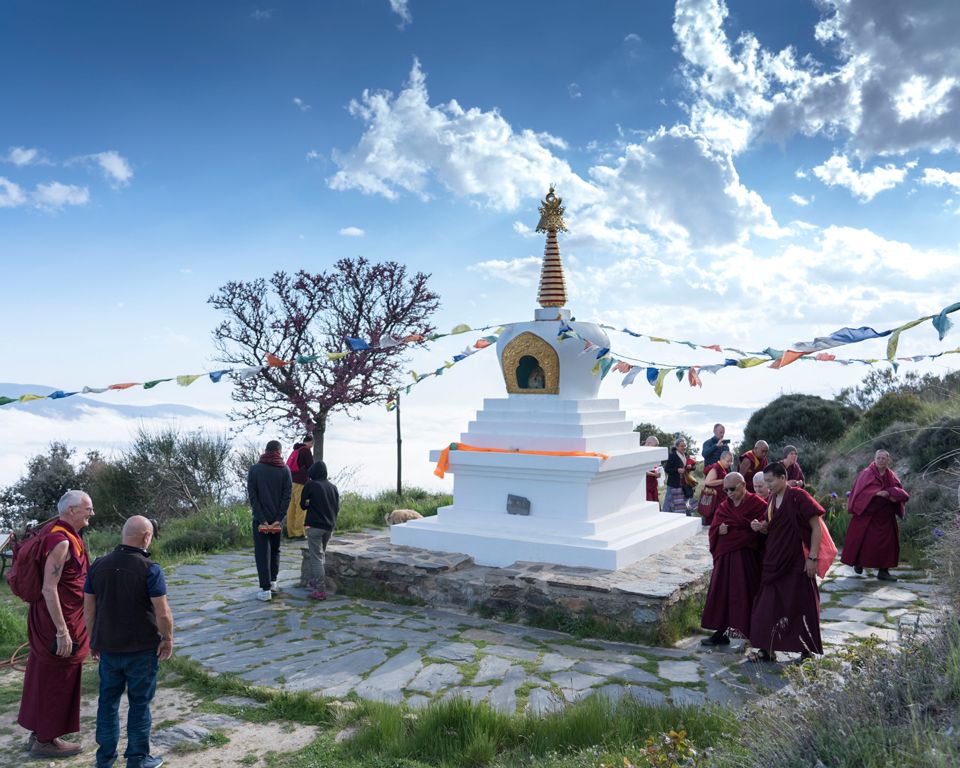
Lama Zopa Rinpoche circumambulating the stupa at O.Sel.Ling, Spain, May 2019. Photo by Ven. Lobsang Sherab.
Lama Zopa Rinpoche gave teachings on how to make offerings and circumambulate holy objects at the sacred stupa at Boudhanath, Nepal, during the pandemic and in a letter to students in Russia who make holy objects. We are pleased to make these teachings available in the booklet form in Create Skies of Merit by Making Offerings and Circumambulating Stupas.
This 32-page booklet explains the benefits of making offerings to and circumambulating stupas as well as how to think when making offerings and how to collect extensive merit.
Rinpoche emphasizes the importance of, first, offering to all sentient beings based on the example of making a flower offering:
“First, we make charity of this flower to every hell being, every hungry ghost, every animal—think of just the ants: scientists say there are about 13,000 different types of ants.”
Rinpoche then teaches the importance of making an offering on behalf of all sentient beings:
“When we offer on behalf of all sentient beings, it includes your father, mother, brother, sister, any friends, your enemy, anyone, including whoever has died. Doing puja for those who’ve been born in the lower realms can liberate them; they can get a higher rebirth and meet the Dharma—they get so much benefit.”
When we think this way, all sentient beings collect merit, whether they are our friends, enemies, or strangers.
Rinpoche also explains how the practice of circumambulating stupas with body, speech, and mind are done. We do not circumambulate stupas just for our own sake, but we go around the holy objects to benefit all sentient beings.
When it comes to the action of speech while doing circumambulation, Rinpoche advises not to waste time gossiping while circumambulating the holy object, but instead recite different mantras and prayers. Circumambulating with our mind means that we do it with devotion to our guru and compassion to all sentient beings as well as do visualizations that the light purifies all sentient beings.
Whenever we have an opportunity to circumambulate holy objects, it is wonderful to apply these simple yet powerful pith instructions by Lama Zopa Rinpoche in order to collect extensive merit.

Lama Zopa Rinpoche shopping for flower offerings, Boudhanath, Nepal, July 2021. Photo by Ven. Lobsang Sherab.
Additional Audio and PDF Resources
This practice was composed by Lama Zopa Rinpoche to create the most extensive merit possible when making any kind of offering. This is one of Rinpoche’s heart practices for the accumulation of merit.
Rinpoche gave this advice on how to collect “the most unbelievable merit” when making offerings, originally in relation to offerings to the Boudha Stupa located in Kathmandu, Nepal.
This booklet explains the benefits of offering flowers to holy objects as well as describes how to do flower offerings including the recitation of the flower offering mantra which makes flower offerings vast, transforming them into ten million or more flower offerings.
Clouds of Offerings Mantra – MP3 Download
This audio contains recitation of Clouds of Offering Mantra by Lama Zopa Rinpoche. This mantra is not only for blessing, it also has the power to multiply the offerings. There are numberless buddhas and by reciting this mantra each buddha receives skies of offerings.
Lama Zopa Rinpoche created this offering card as a welcoming and explanatory sign for anyone visiting the gardens of his house in Aptos, California, USA. Rinpoche has said that anyone can use this where there are many flower and water bowl offerings.
Padmasambhava’s Instruction on Offerings to Stupas
King Trisong Detsen requested Guru Rinpoche to give a teaching on the benefits of prostrating to, circumambulating, making offerings, and offering service to stupas. Padmasambhava gave a detailed explanation of the particular benefits and results of different types of offerings, such as the set of offerings and offerings included in the long mandala offering.
Download Create Skies of Merit by Making Offerings and Circumambulating Stupas for your own practice: https://shop.fpmt.org/stupa-offering-circumambulation-pdf.html
Through comprehensive study programs and practice materials, FPMT Education Services nourishes the development of compassion, wisdom, kindness, and true happiness in individuals of all ages.
- Tagged: circumambulation, holy objects, making merit, stupas
20
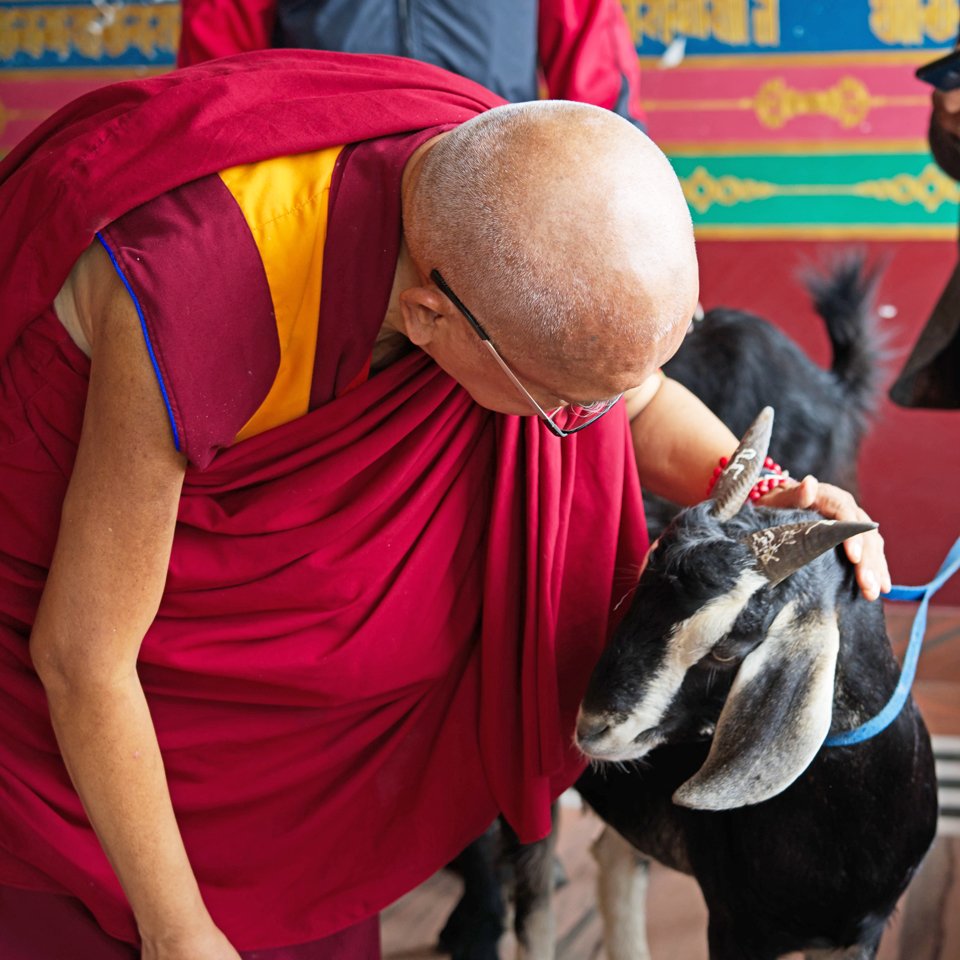
Rinpoche blessing and reciting mantras for two goats that had just been saved from the butcher and live at Animal Liberation Sanctuary, Khachoe Ghakyil Ling (Kopan Nunnery), July 2020. Photo by Ven. Lobsang Sherab.
Lama Zopa Rinpoche compiled a list of mantras and buddhas’ names that are powerful for benefiting animals. We are pleased to make this available in booklet form in Wish-fulfillment for all Animals: Their Happiness and
Rinpoche requested, “These things are so easy to do and have great meaning, and the advice has pure reference, so the intelligent ones should do the practice.”
We also offer the following audio resources:
Recitations for Animals: This audio contains recitations by Lama Zopa Rinpoche suitable for animals to hear throughout their lives – when they are in good health, or when they are sick or dying. Hearing each mantra and text creates an imprint and blessing in the mind that brings the result of good rebirths, liberation from samsara, and ultimately, full enlightenment. Lama Zopa Rinpoche advises that playing them for any animal will bring immense benefit.
The Five Powerful Mantras for Liberating Sentient Beings from the Lower Realms: This album contains Lama Zopa Rinpoche’s oral transmission (*lung) of the five powerful mantras: the Kunrig Mantra, the Stainless Pinnacle Essence Mantra, the Lotus Pinnacle of Amoghapasha Mantra, the Namgyalma mantras (long and short), and the Buddha Mitrugpa Mantra.

Animal blessing, Ganden Tendar Ling, Moscow, Russia, May 2017. Photo by Renat Alyaudinov.
- Tagged: animal liberation, animals
14
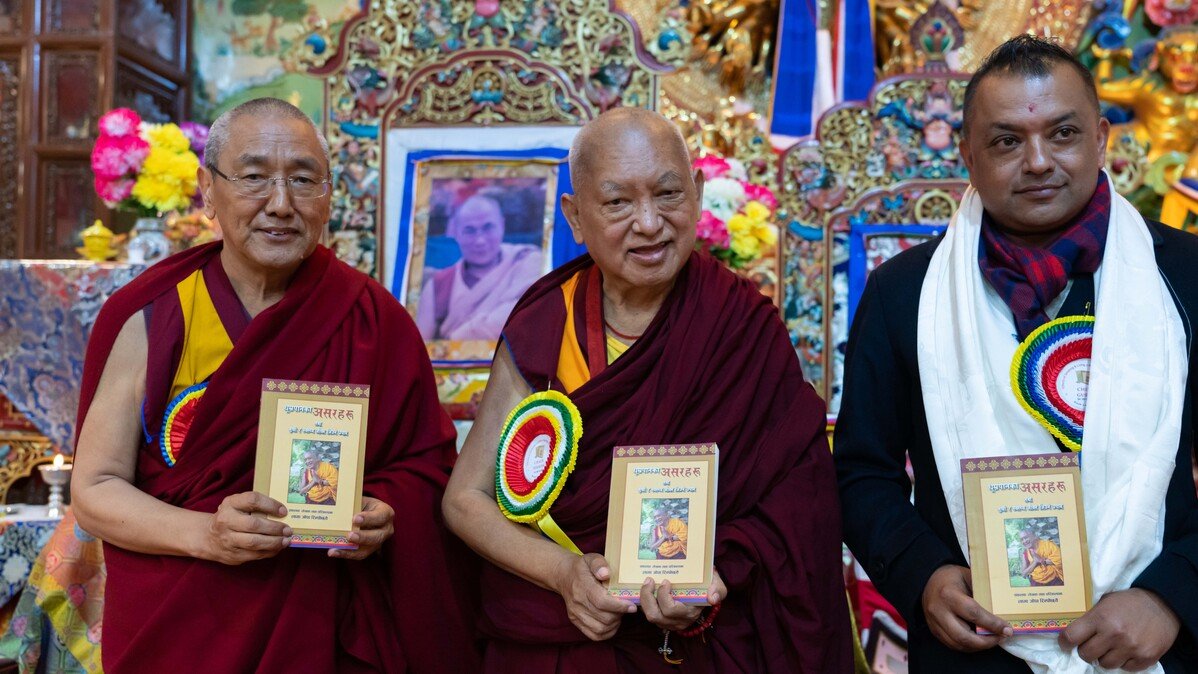
Book release of Lama Zopa Rinpoche’s new book with Khen Rinpoche Geshe Chonyi and Mr. Gagan K. Thapa from the Nepali Parliament’s House of Representatives, Nepal, December 24, 2022. Photo by Ven. Lobsang Sherab.
On December 24, 2022, Lama Zopa Rinpoche attended a book release celebration at Khachoe Ghakyil Ling Nunnery, Nepal, for his new book in Nepali, titled The Effects of Smoking and Living a Healthy and Happy Life. The event drew over 600 guests, including dignitaries such as Mr. Gagan K. Thapa from the Nepali Parliament’s House of Representatives.
It was a joyful celebration including music offered by renowned singers Raju Lama and Ani Choying Drolma.
During the event, Rinpoche discussed the evolution of this new book and offered advice about the harms of smoking tobacco, citing Padmasambhava’s advice, as well as modern science.
This book will be released in English in the future and we look forward to sharing details of this publication when it is available.
Watch Lama Zopa Rinpoche’s teaching “The Effects of Smoking and Living a Healthy and Happy Life”:
https://youtu.be/aAvTq7hWNe4
Lama Zopa Rinpoche is the spiritual director of the Foundation for the Preservation of Mahayana Tradition (FPMT), a Tibetan Buddhist organization dedicated to the transmission of the Mahayana Buddhist tradition and values worldwide through teaching, meditation and community service.
- Tagged: advice from lama zopa rinpoche, video
9
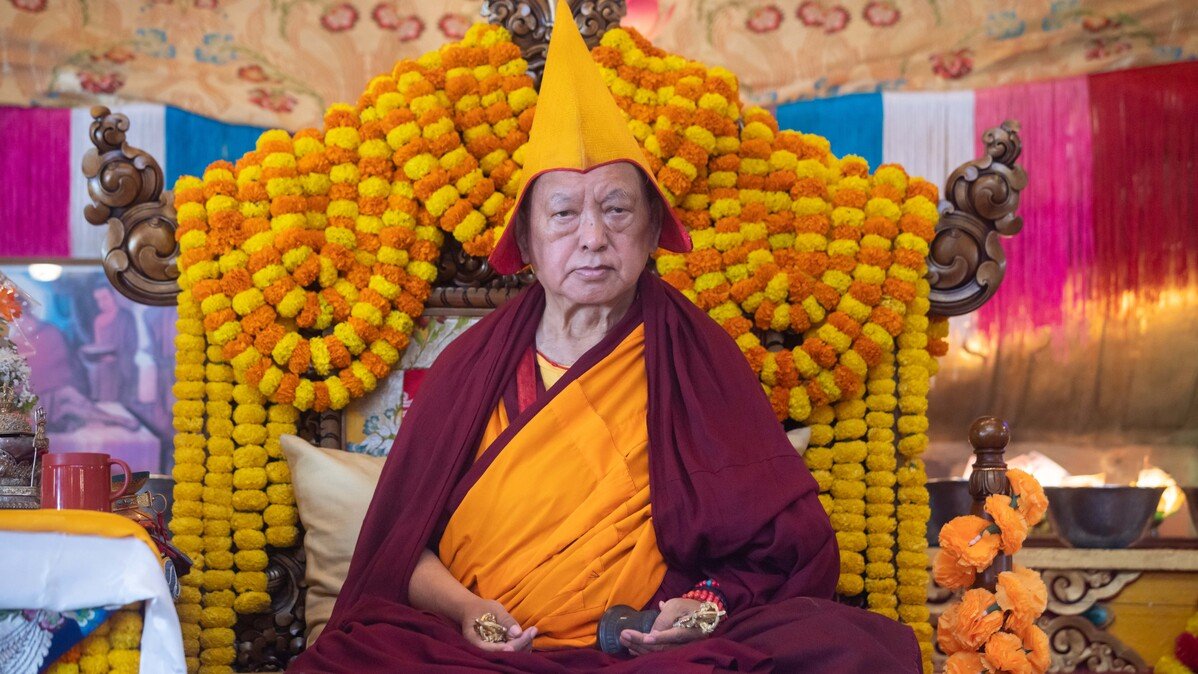
Lama Zopa Rinpoche during the long life puja at Kopan Monastery, Nepal, December 21, 2022. Photo by Ven. Lobsang Sherab.
A long life puja was offered by the entire FPMT organization to Lama Zopa Rinpoche on December 21, 2022 at Kopan Monastery during the fifty-third Kopan lamrim meditation course. This puja was offered in accordance with the advice of Khandro Kunga Bhuma (Khandro-la), and is part of a collection of practices offered for Rinpoche’s health and the well-being of the entire FPMT organization.
During this puja, Rinpoche spoke about the meaning and benefits of the long life puja and how to visualize all the offerings to make it most beneficial.
As a reminder, the FPMT organization will be offering a long life puja to His Holiness the Dalai Lama on May 24, 2023 at Namgyal Monastery, Dharamsala, India.
Watch Lama Zopa Rinpoche’s teaching “The Benefits of Offering a Long Life Puja”:
https://youtu.be/0S7H6VNUSvA
This summary is meant to highlight key topics presented by Rinpoche in the recorded video and is not intended to serve as a full representation of Rinpoche’s teaching, which is best received through watching the video.
Lama Zopa Rinpoche is the spiritual director of the Foundation for the Preservation of Mahayana Tradition (FPMT), a Tibetan Buddhist organization dedicated to the transmission of the Mahayana Buddhist tradition and values worldwide through teaching, meditation and community service.
6
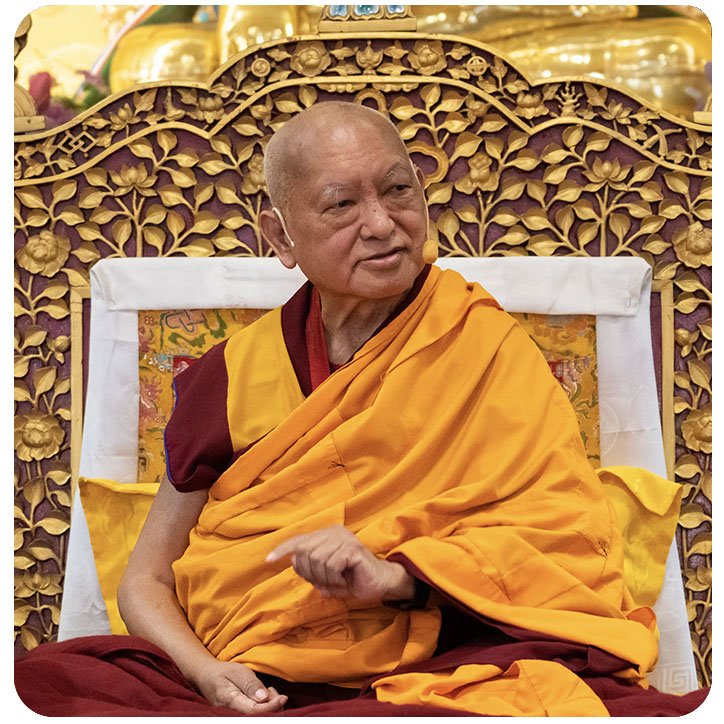
Lama Zopa Rinpoche teaching at the fifty-third Kopan lamrim meditation course, Nepal, December 2022. Photo by Ven. Lobsang Sherab.
Lama Zopa Rinpoche’s profound wisdom has guided the FPMT organization since its inception and his ongoing topical teachings provide the relevant advice we all need to practice Dharma in this modern world. Rinpoche’s message in this year’s FPMT Annual Review 2022: Rejoicing in a Year of Offering the Methods for Peace and Happiness focuses on the importance of practicing patience, the method for keeping enemies away and obtaining peace for oneself and others. From the opening paragraph:
First I want to say that patience is the most important practice to protect one’s merits. Most sentient beings do not know Dharma; they are very far away from Dharma. Then, among the sentient beings who have met Dharma, even if they try to practice it, anger often arises.
Even if they collect merits, because their minds easily come under the control of anger, sooner or later the merits will be destroyed, blown up, by anger. So you must really make effort to protect and not burn all your merits by giving rise to anger.
Without protecting your merits, there is no happiness and you don’t succeed in fulfilling your wishes. You remain continuously in samsara and in the lower realms. Unless you enjoy that, unless what you want is suffering and what you don’t want is happiness, there is only total loss.
We are so happy to offer a downloadable PDF of Rinpoche’s entire eleven page teaching:
fpmt.org/wp-content/uploads/teachers/zopa/advice/advice_from_our_spiritual_director_AR_2022_a5.pdf
Lama Zopa Rinpoche is the spiritual director of the Foundation for the Preservation of Mahayana Tradition (FPMT), a Tibetan Buddhist organization dedicated to the transmission of the Mahayana Buddhist tradition and values worldwide through teaching, meditation and community service.
All are welcome to read this year’s FPMT Annual Review 2022 in its entirety:
https://fpmt.org/fpmt/annual-review-2022
3
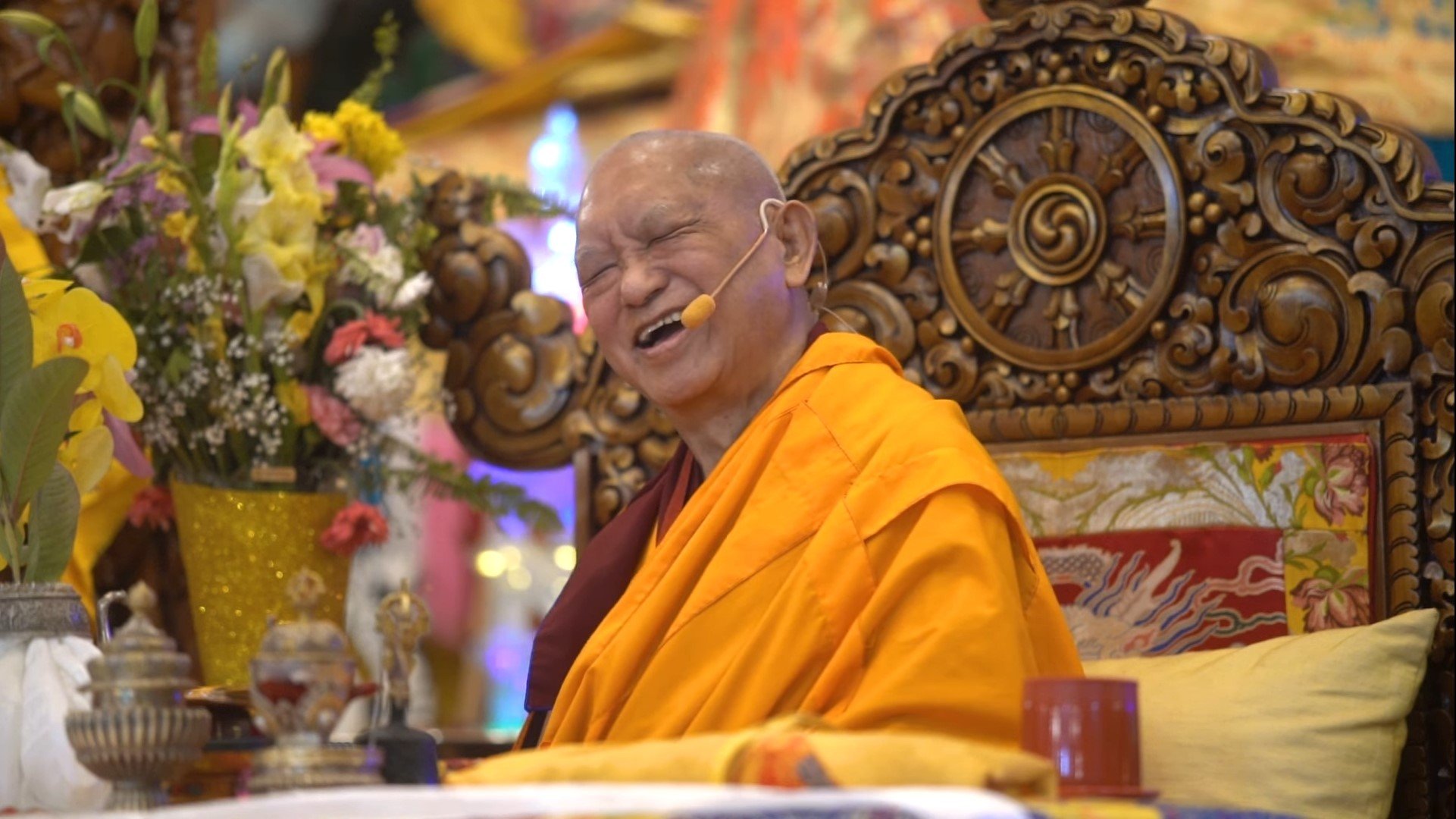
Lama Zopa Rinpoche teaching at the fifty-third lamrim meditation course at Kopan Monastery, December 25, 2022.
Lama Zopa Rinpoche began a refuge ceremony on December 25, 2022 from the fifty-third lamrim meditation course at Kopan Monastery by explaining the importance of relying on Buddha, Dharma, and Sangha. By protecting our karma we are able to be free from samsara.
Before the refuge ceremony begins (at 13:33 in the video), Rinpoche explained the Lesser Vehicle refuge and also Mahayana refuge and shared the motivation for taking refuge:
This is one time that I have received a perfect human body, qualified by eight freedoms and ten richnesses. I have met Buddhadharma that shows the Four Noble Truths, I have met Mahayana Dharma, holy Dharma, that reveals bodhicitta, the path to achieve enlightenment, the six paramitas, and so forth. To free the numberless sentient beings from the oceans of samsaric sufferings and bring them to enlightenment by myself alone, I must achieve the state of omniscience. Therefore, I’m going to take refuge.
While guiding those in attendance in prostrations, Rinpoche discussed the significance of holding one’s hands in the mudra of prostration at the crown of the head, throat, and heart, explaining that this purifies the negative karmas collected with body, speech, and mind from beginningless rebirths and creates the cause to achieve Buddha’s holy body, speech, and mind. Rinpoche also discussed what to visualize when doing prostrations and the benefits of this practice.
Rinpoche also explained the benefits of taking refuge in the Guru, Buddha, Dharma, and Sangha and offered refuge and lay vows.
Please note, the video recording stops just before Rinpoche begins the jenang ritual of Vajrasattva.
We invite you to go deeper into the topics presented here, plus many others, by watching Rinpoche’s video below, and reading the full transcript of Rinpoche’s teaching. An unedited video recording of the live transcription alongside Rinpoche’s teaching is also available to watch.
Watch Lama Zopa Rinpoche’s teaching “Refuge Ceremony”:
https://youtu.be/ugnRiDXh8nI
This summary of Lama Zopa Rinpoche’s teaching is by Carina Rumrill based on the transcript by Ven. Joan Nicell. Editorial input and additions by Justin Jenkins.
This summary is meant to highlight key topics presented by Rinpoche in the recorded video and is not intended to serve as a full representation of Rinpoche’s teaching, which is best received through watching the video.
Lama Zopa Rinpoche is the spiritual director of the Foundation for the Preservation of Mahayana Tradition (FPMT), a Tibetan Buddhist organization dedicated to the transmission of the Mahayana Buddhist tradition and values worldwide through teaching, meditation and community service.
1
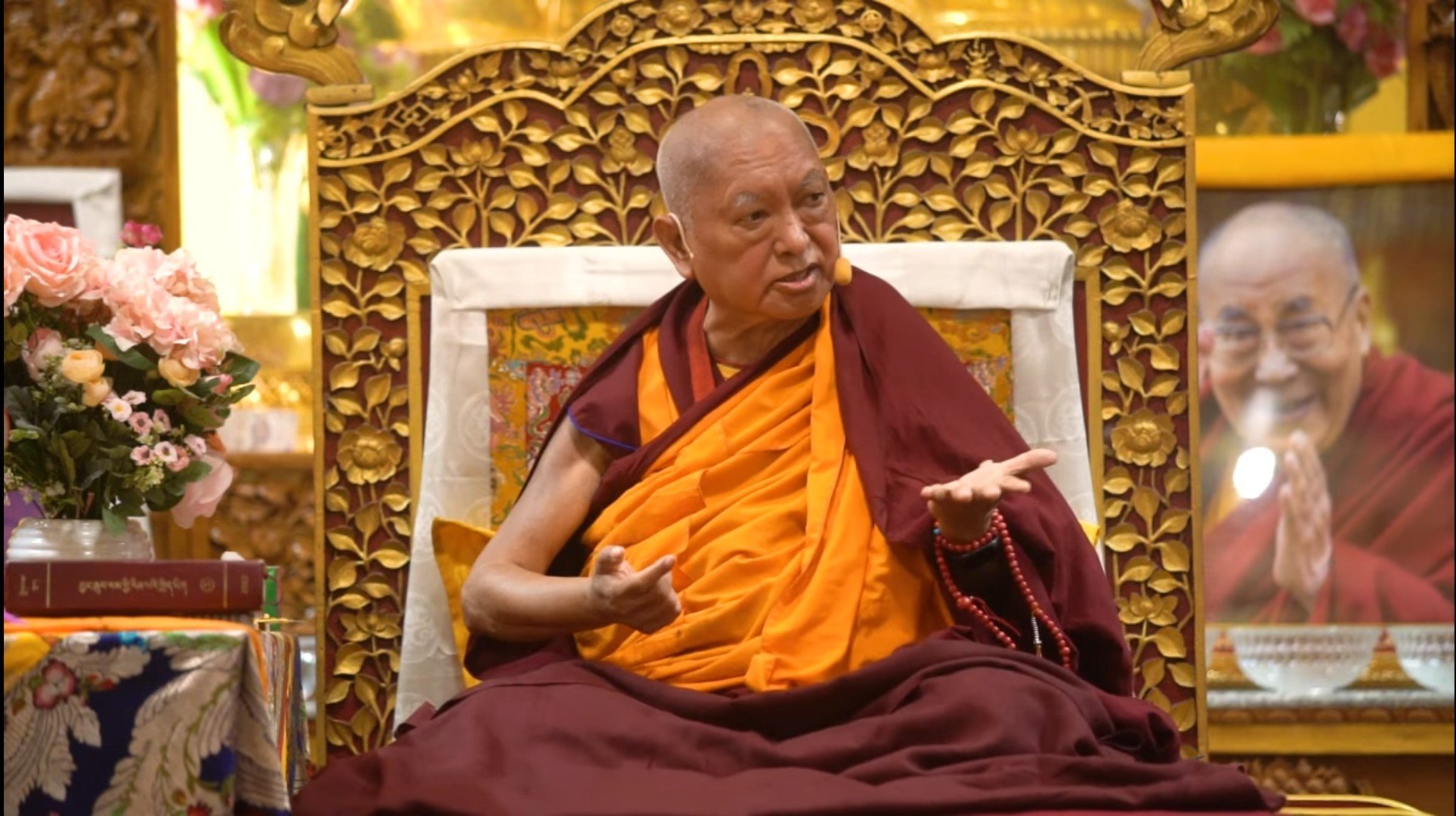
Lama Zopa Rinpoche teaching at the fifty-third Kopan November Course, December 25, 2022.
Put all of your effort into realizing dependent arising, Lama Zopa Rinpoche urges in his December 25, 2022 teaching from the fifty-third lamrim meditation course at Kopan Monastery, Nepal. It is childish to believe that things exist from their own side, Rinpoche explains, so don’t cling to hallucinated appearances.
Whatever you are doing, meditate on how the I came into existence. Why? Because all problems come from believing that the I exists from its own side. The more you meditate, the more you realize that what exists from its own side does not exist at all.
We invite you to go deeper into the topics presented here, plus many others, by watching Rinpoche’s video below. A final transcript will be provided here once it is available. An unedited video recording of the live transcription alongside Rinpoche’s teaching is also available to watch.
Watch Lama Zopa Rinpoche’s teaching “Put All Your Effort into Realizing Dependent Arising”:
https://youtu.be/ugnRiDXh8nI
This summary of Lama Zopa Rinpoche’s teaching is by Carina Rumrill based on the transcript by Ven. Joan Nicell. Editorial input and additions by Justin Jenkins.
This summary is meant to highlight key topics presented by Rinpoche in the recorded video and is not intended to serve as a full representation of Rinpoche’s teaching, which is best received through watching the video.
Lama Zopa Rinpoche is the spiritual director of the Foundation for the Preservation of Mahayana Tradition (FPMT), a Tibetan Buddhist organization dedicated to the transmission of the Mahayana Buddhist tradition and values worldwide through teaching, meditation and community service.
14
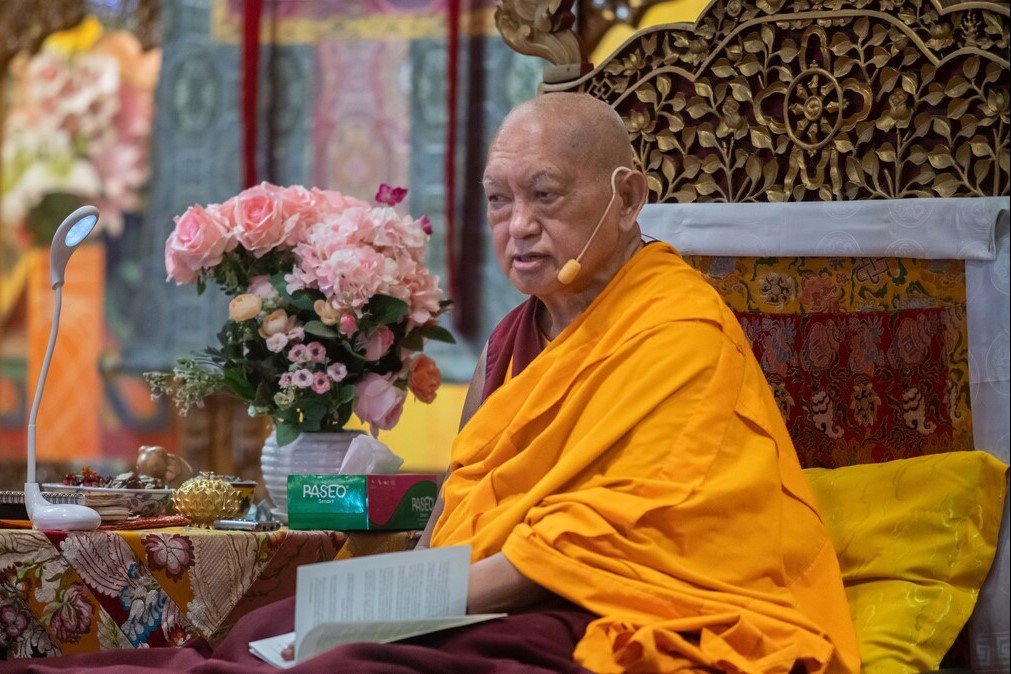
Lama Zopa Rinpoche teaching during the Kopan November Course, giving the oral transmission of the lamrim text Essence of Nectar, December 22, 2022. Photo by Ven. Lobsang Sherab.
Lama Zopa Rinpoche offered the complete oral transmission (lung) of The Essential Nectar of Holy Doctrine, also known as the Essence of Nectar, one of the eighteen great lamrim texts by Yeshe Tsondro. It was given over two teachings from the fifty-third lamrim meditation course at Kopan Monastery on December 22 and 23, 2022.
This is one of the most important texts for anyone sincerely studying the lamrim or who receives lamrim preliminaries from Rinpoche. All are welcome to take this oral transmission from the videos and receive it. As Rinpoche has explained, even if you don’t understand the words at all, even hearing the sound of Buddha’s teachings becomes a great purification and collection of merit. It is very important not to distract your mind or let it wander. There are three types of lungs one can receive—when we hear all the words and understand everything; when we hear it all but have a rough understanding of the meaning, that’s the middle lung; and then if we don’t understand but hear all the words, that is the last lung.
We should listen to each word of the oral transmission to benefit sentient beings, Rinpoche advises, “to achieve realization of the whole path, what is mentioned here, in your heart. And also each word that you hear to benefit the numberless sentient beings. And as they hear each word of this, sentient beings are able to achieve realization immediately in their hearts, especially bodhicitta, to actualize bodhicitta immediately in their hearts, and become free from lower realms, free from samsara, and achieve enlightenment as quickly as possible. Please dedicate like that, that you listening to this lung is useful to every sentient being. Listen to pacify war, famine, disease in the country, torture, and to pacify immediately all the dangers of earth, water, fire, and wind. So you are taking each word of the lung for the benefit of that.”
Rinpoche begins offering the oral transmission at 1:31:40 of the December 22 teaching and continues at 1:05:41 of the December 23 teaching.
While offering this oral transmission over the two teachings, Rinpoche also taught on other topics including the preciousness of every single sentient being, the power of having a good heart, how to bear hardships to practice Dharma, how we can receive great inspiration from the enlightenment stories of great yogis (rather than reading novels), how rejoicing keeps your mind in a happy place, how practicing patience causes a happy life, and many other important topics.
We invite anyone with interest to receive this very previous oral transmission from Rinpoche by listening to the two videos as Rinpoche has instructed. Final transcripts will be provided here once they are available. Unedited video recordings of the live transcription alongside Rinpoche’s teaching is also available to watch in Video 1 and Video 2.
Watch Lama Zopa Rinpoche’s teaching “Rinpoche Begins the Oral Transmission of Essential Nectar”:
https://youtu.be/x2L7cLeeSDw
Watch Lama Zopa Rinpoche’s teaching “Rinpoche Concludes the Oral Transmission of Essential Nectar”:
https://youtu.be/i-niRbs-q_M
This summary of Lama Zopa Rinpoche’s teaching is by Carina Rumrill based on the transcript by Ven. Joan Nicell. Editorial input and additions by Justin Jenkins.
This summary is meant to highlight key topics presented by Rinpoche in the recorded video and is not intended to serve as a full representation of Rinpoche’s teaching, which is best received through watching the video.
Lama Zopa Rinpoche is the spiritual director of the Foundation for the Preservation of Mahayana Tradition (FPMT), a Tibetan Buddhist organization dedicated to the transmission of the Mahayana Buddhist tradition and values worldwide through teaching, meditation and community service.
9
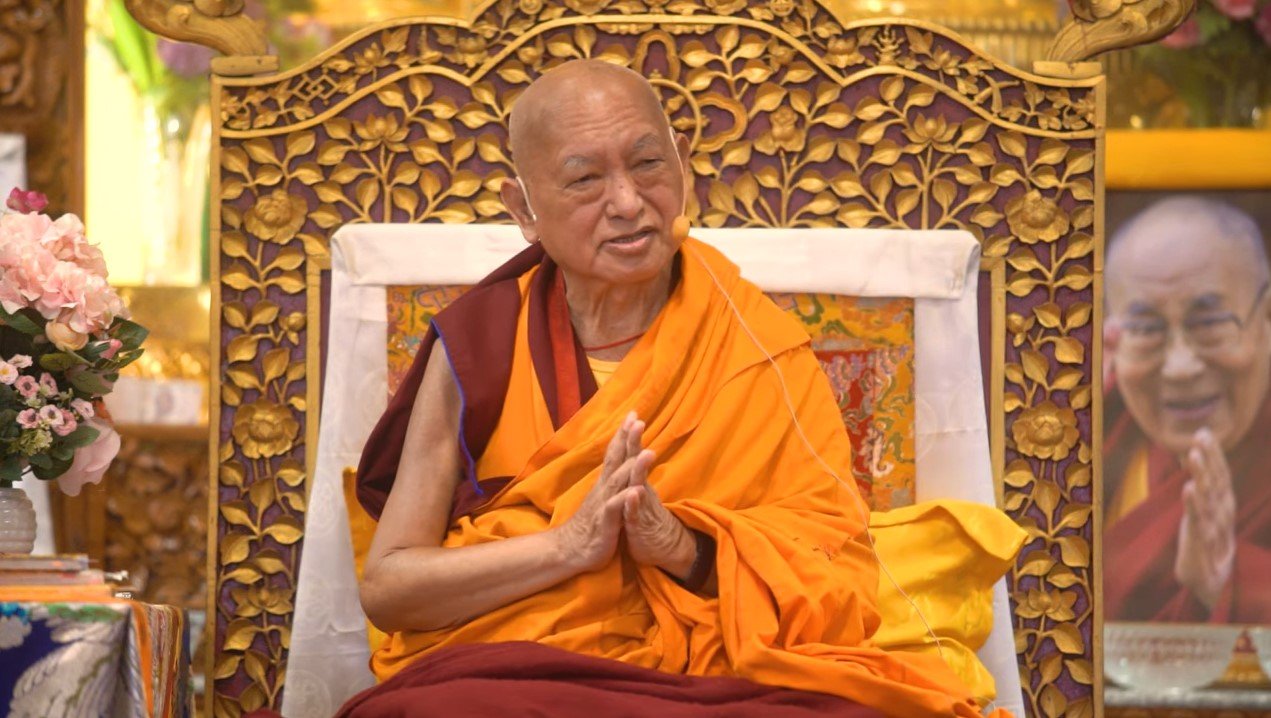
Lama Zopa Rinpoche teaching at the fifty-third Kopan lamrim meditation course, Nepal, December 2022.
In this world, there are so many ways to help others, Rinpoche explains in this teaching given on December 20, 2022 from the fifty-third lamrim meditation course at Kopan Monastery, Nepal. With a bodhicitta motivation, we receive more than skies of merit, and then we can benefit so many sentient beings. Even if you aren’t Buddhist and don’t build statues and stupas, there is still so much you can do for others even with one dollar. Often the money people earn comes from creating negative karma with attachment to reputation, pleasure, and the happiness of this life. Then, at the time of death, those who are most famous and extremely wealthy, there is so much suffering when separating from the family, their wealth, their body, without thinking of the next life. The person has no idea what to do when they die, they didn’t study anything about death. They even tried to ignore the thought of death coming. This is the biggest mistake in life. Meanwhile, many monks in the monasteries are very simple with no possessions or reputation, no one thinks they are so great, but at the time of their passing they are in meditation and totally prepared. This is amazing.
There are many good people in the West who have a good heart; who think of others’ happiness first. On the other side, if we only think of ourselves—our own happiness and reputation, so many problems arise. We don’t get along with others, we fight, we make others angry, we have family problems. If we want other people to love and help us, we need to love and help them.
First, we need to equalize ourselves with others, we must cherish others like we cherish ourselves. Secondly, we exchange ourselves with others. Rather than working for ourselves alone which is just one person, we can work for others—eat for others, sleep for others, help for others, be healthy so we can help others, do business for others, shopping and daily life—everything we can do for others.
It is most important to help others. Even a small service like offering your seat to someone who needs it, offering any small benefit to help someone else, this is so important. This is so important. It is a great pleasure to serve others, to take care of others. Serving others is what makes life meaningful. This is how to develop bodhicitta—from each service you offer to someone else, you achieve enlightenment.
We invite you to go deeper into the topics presented here, plus many others, by watching Rinpoche’s video below, and reading the full transcript of Rinpoche’s teaching. An unedited video recording of the live transcription alongside Rinpoche’s teaching is also available to watch.
Watch Lama Zopa Rinpoche’s teaching “Even Offering a Little Help to Others Is So Important”:
https://youtu.be/Z4rupF3Nw1I
This summary of Lama Zopa Rinpoche’s teaching is by Carina Rumrill based on the transcript by Ven. Joan Nicell. Editorial input and additions by Justin Jenkins.
This summary is meant to highlight key topics presented by Rinpoche in the recorded video and is not intended to serve as a full representation of Rinpoche’s teaching, which is best received through watching the video.
Lama Zopa Rinpoche is the spiritual director of the Foundation for the Preservation of Mahayana Tradition (FPMT), a Tibetan Buddhist organization dedicated to the transmission of the Mahayana Buddhist tradition and values worldwide through teaching, meditation and community service.
8
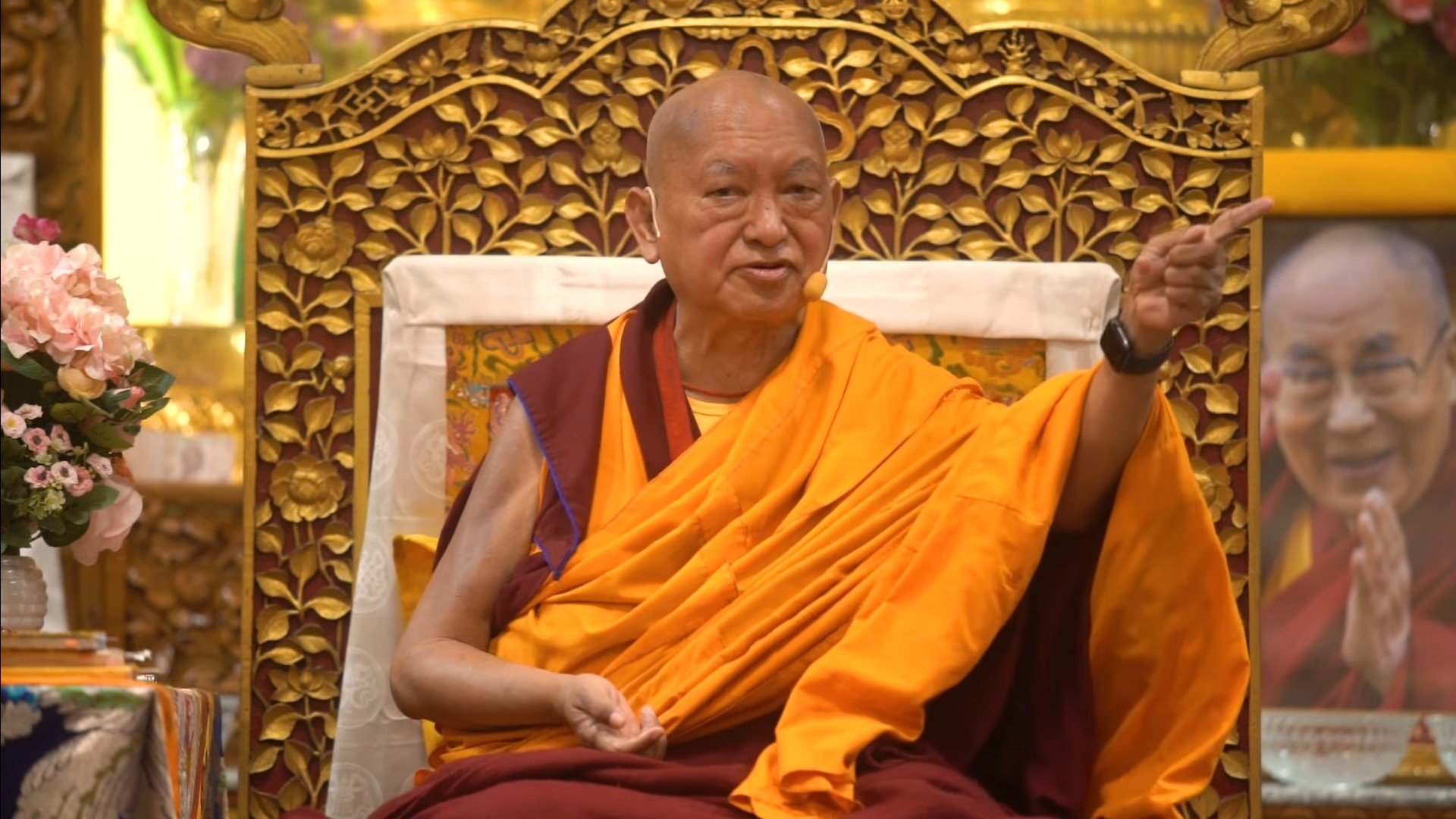
Lama Zopa Rinpoche teaching at the fifty-third Kopan lamrim meditation course, Nepal, December 2022.
On the occasion of Lama Tsongkhapa Day, December 18, 2022, Lama Zopa Rinpoche offered a teaching to the participants of the fifty-third Kopan lamrim meditation course about the very special qualities of Lama Tsongkhapa’s teachings.
After an extensive explanation on how to set one’s motivation for listening to lamrim teachings, Rinpoche shares that one of the special qualities is how Lama Tsongkhapa clearly explained the lamrim. This makes it possible for us to not make mistakes on the path to enlightenment. There are many lamrim teachings by so many lamas, but after many years of studying, if we haven’t read Lama Tsongkhapa’s teachings, when we finally do, we will think, “Oh! I should have read this many years ago, I should have read this first.”
Rinpoche explains that Lama Tsongkhapa received teachings directly from Manjushri, the buddha of wisdom, seeing Manjushri directly, like a guru and disciple in the same room. The essence of what Manjushri taught Lama Tsongkhapa are the three principal aspects of the path to enlightenment.
Another special quality of Lama Tsongkhapa’s teachings is his clarification of the Prasangika-Madhyamaka view of emptiness. These teachings were so clear and extensive, “the finest,” Rinpoche explains.
Rinpoche stressed that most people in the world either believe in nihilism or eternalism, and therefore cannot be liberated from samsara. Rinpoche explained that to believe that things truly exist from their own side, or to believe that nothing exists at all—both of these wrong beliefs prevent us from abandoning the root of samsara, the ignorance holding the I as truly existent.
We invite you to go deeper into the topics presented here, plus many others, by watching Rinpoche’s video below, and reading the full transcript of Rinpoche’s teaching. An unedited video recording of the live transcription alongside Rinpoche’s teaching is also available.
Watch Lama Zopa Rinpoche’s teaching “The Special Qualities of Lama Tsongkhapa’s Teachings”:
https://youtu.be/fPQO02nTlrQ
This summary of Lama Zopa Rinpoche’s teaching is by Carina Rumrill based on the transcript by Ven. Joan Nicell. Editorial input and additions by Justin Jenkins.
This summary is meant to highlight key topics presented by Rinpoche in the recorded video and is not intended to serve as a full representation of Rinpoche’s teaching, which is best received through watching the video.
Lama Zopa Rinpoche is the spiritual director of the Foundation for the Preservation of Mahayana Tradition (FPMT), a Tibetan Buddhist organization dedicated to the transmission of the Mahayana Buddhist tradition and values worldwide through teaching, meditation and community service.
3
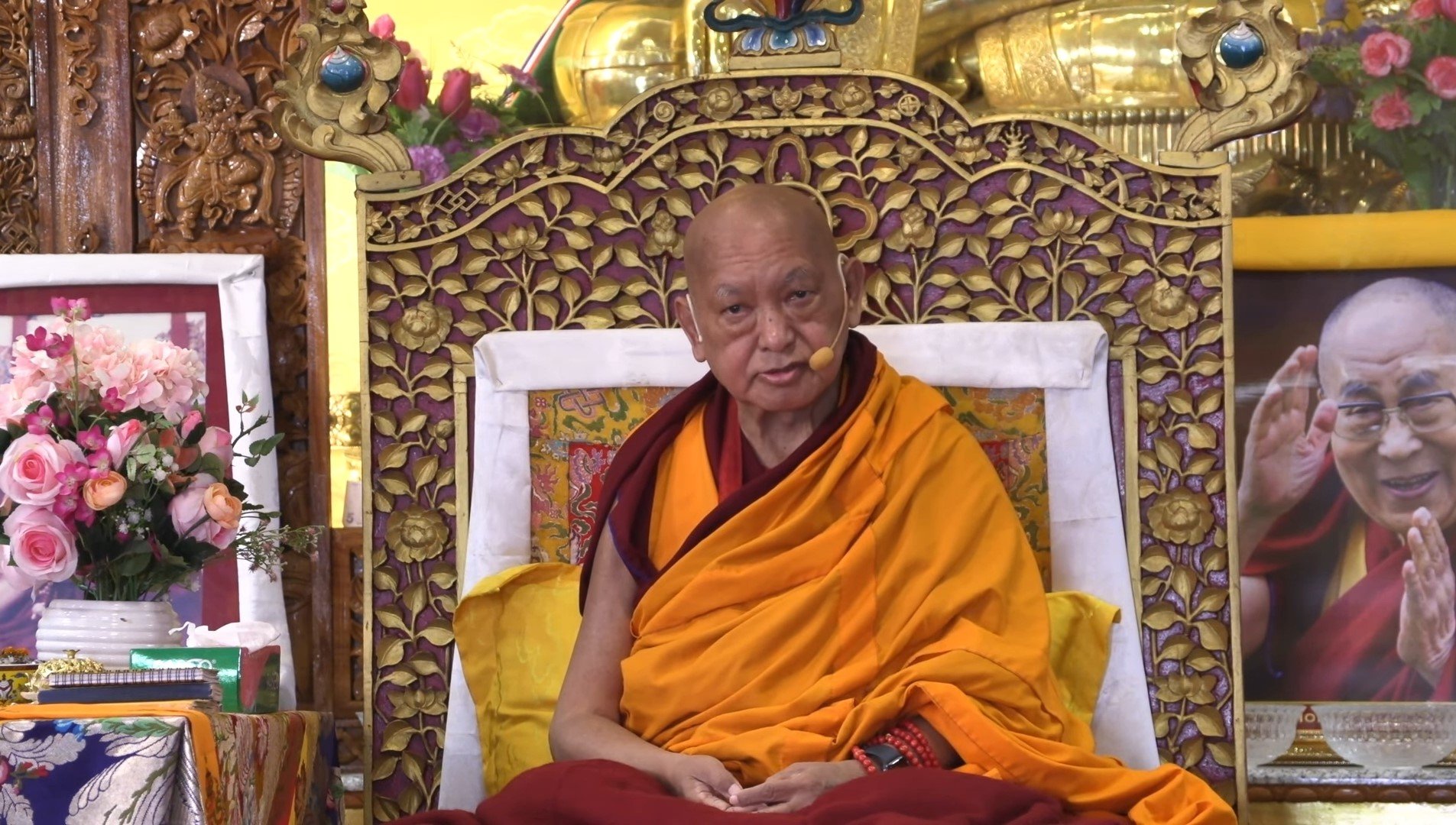
Lama Zopa Rinpoche teaching at the fifty-third Kopan lamrim meditation course, Nepal, December 17, 2022.
We bear unbelievable hardships for this body that we cherish more than anything. We keep it clean, spend lots of money on clothes and food for it, spend time exercising, doing hard work for money, and so much worry and fears taking care of the body. This is the same for billionaires and poor people, there is so much discontentment and dissatisfaction, we try to get everything we can from the world, we try to find happiness but we experience continual physical and mental problems, relationship, and business problems. In spite of all these hardships we bear for the body, one day we will die, Rinpoche explains in this teaching given on December 17 from Kopan Monastery during the fifty-third lamrim meditation course. All of these efforts and hardships we undertake for our body, if done with attachment to this life, becomes negative karma. It is so difficult to think of future lives, we can’t bear it. We don’t think of impermanence-death in everyday life. Every day we think we are going to live many years. Even on the same morning that we die, we may think this. We cheat ourselves bearing hardships for this body, which we only have for this one life.
Rather than using this body to obtain things that have no meaning, we can use it and bear all hardships to practice Dharma, for the happiness of future lives. If we postpone our Dharma practice, we have no way of knowing how long we are going to live. Some people think they will practice Dharma only when they are old. But there’s no guarantee we will ever become old.
This body which we bear so many hardships for, and which we cherish more than anything, is the cause of all of our sufferings from beginningless rebirths. Rinpoche shares that the Seventh Dalai Lama, Gyalwa Kelzang Gyatso said, “This body is like a sack filled with khaka.” Rinpoche explains that this means the body is in the nature of suffering. To generate bodhicitta, to generate compassion for numberless sentient beings—this comes from renunciation, realizing that this body is in nature of suffering. By recognizing this we don’t get attached, we are liberated from the suffering body.
Rinpoche explains the benefits of receiving lungs (oral transmissions) and the motivation for receiving them. Rinpoche then offers those in attendance the oral transmissions of “Calling the Guru from Afar,” and the Dorje Khadro fire puja (at 1:30:52 in the video).
We invite you to go deeper into the topics presented here, plus many others, by watching Rinpoche’s video below, and reading the full transcript of Rinpoche’s teaching. An unedited video recording with the live transcription alongside Rinpoche’s teaching is also available.
Watch Lama Zopa Rinpoche’s teaching “Use Your Body and Bear Hardships to Practice Dharma”:
https://youtu.be/9hnSIOQNW1E
This summary of Lama Zopa Rinpoche’s teaching is by Carina Rumrill based on the transcript by Ven. Joan Nicell. Editorial input and additions by Justin Jenkins.
This summary is meant to highlight key topics presented by Rinpoche in the recorded video and is not intended to serve as a full representation of Rinpoche’s teaching, which is best received through watching the video.
Lama Zopa Rinpoche is the spiritual director of the Foundation for the Preservation of Mahayana Tradition (FPMT), a Tibetan Buddhist organization dedicated to the transmission of the Mahayana Buddhist tradition and values worldwide through teaching, meditation and community service.
- Home
- News/Media
- Study & Practice
- About FPMT Education Services
- Latest News
- Programs
- New to Buddhism?
- Buddhist Mind Science: Activating Your Potential
- Heart Advice for Death and Dying
- Discovering Buddhism
- Living in the Path
- Exploring Buddhism
- FPMT Basic Program
- FPMT Masters Program
- FPMT In-Depth Meditation Training
- Maitripa College
- Lotsawa Rinchen Zangpo Translator Program
- Universal Education for Compassion & Wisdom
- Online Learning Center
- Prayers & Practice Materials
- Overview of Prayers & Practices
- Full Catalogue of Prayers & Practice Materials
- Explore Popular Topics
- Benefiting Animals
- Chenrezig Resources
- Death & Dying Resources
- Lama Chopa (Guru Puja)
- Lama Zopa Rinpoche: Compendium of Precious Instructions
- Lama Zopa Rinpoche: Life Practice Advice
- Lama Zopa Rinpoche Practice Series
- Lamrim Resources
- Mantras
- Prayer Book Updates
- Purification Practices
- Sutras
- Thought Transformation (Lojong)
- Audio Materials
- Dharma Dates – Tibetan Calendar
- Translation Services
- Publishing Services
- Teachings and Advice
- Find Teachings and Advice
- Lama Zopa Rinpoche Advice Page
- Lama Zopa Rinpoche: Compendium of Precious Instructions
- Lama Zopa Rinpoche Video Teachings
- ༧སྐྱབས་རྗེ་བཟོད་པ་རིན་པོ་ཆེ་མཆོག་ནས་སྩལ་བའི་བཀའ་སློབ་བརྙན་འཕྲིན།
- Podcasts
- Lama Yeshe Wisdom Archive
- Buddhism FAQ
- Dharma for Young People
- Resources on Holy Objects
- Ways to Offer Support
- Centers
- Affiliates Area
- Teachers
- Projects
- Charitable Projects
- Make a Donation
- Applying for Grants
- News about Projects
- Other Projects within FPMT
- Support International Office
- Projects Photo Galleries
- Give Where Most Needed
- FPMT
- Shop
Translate*
*powered by Google TranslateTranslation of pages on fpmt.org is performed by Google Translate, a third party service which FPMT has no control over. The service provides automated computer translations that are only an approximation of the websites' original content. The translations should not be considered exact and only used as a rough guide.Don’t forget that the starving person preoccupied by hunger and the person obsessing over what to buy next at the supermarket are basically the same. Mentally, rich and poor are equally disturbed, and, fundamentally, one is as unhappy as the other.







